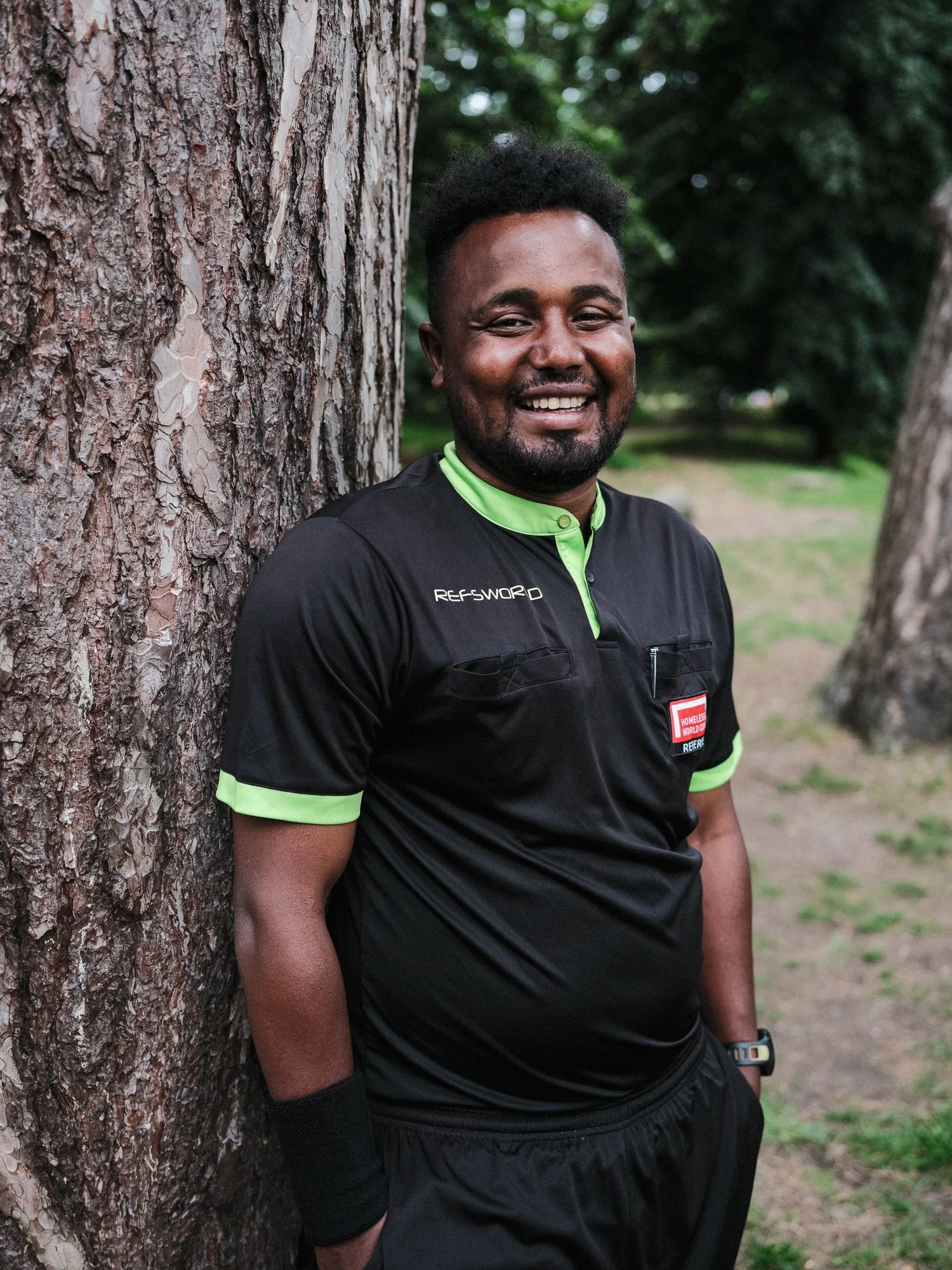“I'm not saying I deserve it, but I'm ready for it”
|Image: Paul Bence
Without the referee—without the person in the middle of the pitch with the whistle in hand—we wouldn’t have any football. And we wouldn’t have a Homeless World Cup.
Sometimes we forget that. That the referees are as important as the players themselves. And that they love the game as much as we do. They might even have been or are the players themselves.
That’s the case with Adil Leite, the referee chosen to officiate the 2019 Homeless World Cup men’s final in Cardiff between Chile and Mexico.
He described his feelings as he prepared to take to the field with the teams.
“I’m very happy and I’m excited. I don’t know what to say. I don’t know how to describe this because I was a player in Poznan [in 2013]. Now I am refereeing the final. I didn’t dream of this. It’s a big dream to dream. But now it’s here and it’s incredible. It’s great,” he said.
Leite believes that the experience of being a player for his adopted nation Norway in Poland helped him to turn his life around and look towards the future in a more positive light.
“That was the best experience of my life. After that I wanted to go straight and do the right things in life and give back to the community who gave me a chance.
|Image: Paul Bence
“I got involved more to help others who were struggling and who went through the same situations that I had. After that, everything got better and better,” he said.
It begs the question as to why Leite made the transition from being a footballer to becoming a referee in the first place and what it meant for him to have been able to do so.
“I’m a quiet and relaxed person. I’m not a ‘referee’ type of person. But I love football and I wanted the chance to continue with it, so when they gave me a chance to come to Glasgow [in 2016] to be a referee of course I said yes.
“After that I became a better person because when I’m on the pitch I have control, I have everything that I hadn’t exactly figured out how to have yet. You know. I don’t know how to explain … a good person. It made me a good person.
“And now everyone is looking up to me. Everyone is saying that I do a good job and everything, That gives me confidence to do it more, and when I came to the Homeless World Cup I wanted to do so every year, so that keeps me doing what I do,” he said.
Now Leite works with the Salvation Army back in his home city of Stavanger, in an academy that trains players who represented Norway and are looking to continue as part of the street soccer programme into the future.
Having been a player himself, Leite shares a lot in common with those who have played in the tournament for their countries and those he is officiating in matches here in Cardiff.
In particular, a past troubled by addiction. But one that changed thanks to football.
“I had a rough time. I’m from Africa, and when I came to Norway it was very difficult. I befriended not so good people, bad people, and then I tried to take drugs and everything. After that life was not so good. So one day they asked me if I wanted to play football.
“I know I love to play football and when I’m on the pitch everything goes away.
“And once this happened I wanted more of it,” he said.
It was his desire to ‘give something back’ to the street soccer programme that helped change his life that ultimately motivated Leite to become a referee.
“I played [street soccer] for five years, and after that it was a little bit boring. It’s hard to say, but I loved to play but I wanted more involvement, I wanted to give something back. I still play, but I want to give more back.
“It changed my life, so I wanted other people to experience the feeling I got from playing in the Homeless World Cup. With Norway. With the national team. The whole package,” he said.
So having experienced both being a player and a referee, which one is better for Leite?
“After five years of playing, being a referee is good. To represent Norway at the Homeless World Cup, that was fantastic and everybody is looking at you and if you do something wrong nobody cares. But when you referee, if you do some mistakes people want to kill you!
“So at the stage I’m at now, I like refereeing. Because I want to do more than just play. Even if both are very good,” he said.
He thanks the support of his fellow referees and the bond between them for guiding him along the way to where he is now, at the pinnacle of the street soccer profession.
“They are fantastic. They have supported me since Day 1. It’s a good family. They take care of me like my own family. They’ve been good to me. They are very experienced referees, and I learn a lot of things from them every day that I’m here. So I’m very grateful,” he said.
And what were his feelings when he was told he’d be referring the final?
“I didn’t believe it, but I don’t know, when you know you do what you do sometimes you get something back. So I think this is a moment that has paid off [for me].
“I’m not saying I deserve it, but I’m ready for it,” he said.
Words: Craig Williams
Images: Paul Bence / Soda-Visual


